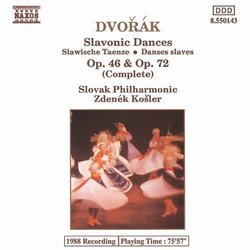| All Artists: Antonin Dvorak, Zdenek Kosler, Slovak Philharmonic Orchestra, Slovakia Philharmonic Orchestra Title: Dvorak: Slavonic Dances, Op. 46 & Op. 72 Members Wishing: 0 Total Copies: 0 Label: Naxos Release Date: 6/30/1992 Genres: Dance & Electronic, Classical Styles: Chamber Music, Historical Periods, Classical (c.1770-1830) Number of Discs: 1 SwapaCD Credits: 1 UPCs: 730099514323, 4891030501430 |
Search - Antonin Dvorak, Zdenek Kosler, Slovak Philharmonic Orchestra :: Dvorak: Slavonic Dances, Op. 46 & Op. 72
 | Antonin Dvorak, Zdenek Kosler, Slovak Philharmonic Orchestra Dvorak: Slavonic Dances, Op. 46 & Op. 72 Genres: Dance & Electronic, Classical
|
Larger Image |
CD Details |
CD ReviewsSlow, slower, slowest JJM Peters | Nijmegen, The Netherlands | 08/13/2002 (2 out of 5 stars) "Dvorak's slavonic dances are possibly (apart from his ninth symphony) his most popular works. This is not surprising, since they are uplifting, humorous, melodramatic, well-composed but not academic pieces. These pieces have been recorded many times, with variable success. Since I already had three copies of the Slavonic dances I was not inclined to buy this CD until I found it in a second hand shop for (luckily) about a dollar. Since both the orchestra and the cunductor are Slavonic, I thought it was a pretty good bargain. But I was rather disappointed when I listened to the disc. It was like listening to a slow-motion rendering of the dances. Even while Kosler leaves out practically any repetition prescribed in the score, he somehow manages to finish the pieces in about the same time as his faster colleagues. Now I'm aware that the tempi in classical music are always subject to discussion, but Kosler pushes the limit. The exuberance normally associated with these pieces is all but gone. Where the drive and rythmical play that characterize other recordings (like the one from DG) make up a lot of the charm, these dances are dull at best. Even the more lyrical parts do not really come across, because the contrasts are gone. I gave two stars because this disc can be used as a play-along CD for amateur orchestra members that have the audacity to put these works on their programme. For the rest I find this a rather shameful disc in the (generally) very good Naxos catalogue." Somewhat inferior orchestra, dreadful acoustics Leslie Richford | Selsingen, Lower Saxony | 10/24/2004 (3 out of 5 stars) "It was a good idea to record all of Dvorak's 'Slavonic Dances' (both series) with a Slovakian orchestra under a Czech conductor, and taken superficially the resulting CD is a pleasant enough affair. Kosler takes the individual dances at a fair pace (Naxos has completely misprinted the track timings on the back cover, making them look quite a lot longer and slower than they actually are), but he was faced with two problems: one was the somewhat inferior quality of the orchestra (a comparison with Rafael Kubelik's superb 1975 recording for Deutsche Grammophon with the Bavarian Radio Symphony Orchestra shows up the difference quite starkly!), the other was the dreadful acoustics in the Bratislava Concert Hall which produce a sharp, echoey sound (noticeable especially when listening via headphones). If you can get the Kubelik, you will find it much more pleasing to the ear." It's a contender Robert T. Martin | 02/20/2008 (5 out of 5 stars) "I don't know if there is a "best" recording of the Slavonic Dances but Maestro Kosler's entry, recorded in 1987/88, is a serious contender. These performances are well inflected,yet the tempo transitions don't jar the listener and there's plenty of feeling. Maestro Kosler's attention to inner voices (he doesn't emphasize the strings) gives the listener an appreciation of Dvorak's marvelous orchestration without disturbing the overall line. I find the tempos are in the mainstream. I did a comparison with Karel Sejna's recording with the Czech Philharmonic and while Kosler is a bit slower in the fast dances he's faster in the slower ones (one person's weed is another's flower). I would describe Kosler's overall approach as relaxed as opposed to impulsive. As one reviewer noted the sound does have an "echoey" feel to it and it could be warmer yet no significant details are sacrificed. Another reviewer pointed out some weaknesses with the orchestra and I have to agree that the playing is scrappy at times and the string tone is far from lush. So if the orchestra is not world class and the sound could be better why 5 stars? Well for me Kosler's interpretation provides another way to appreciate these little masterpieces. Yes the competition is serious and every collection should have the Szell(if there is a standard recording of these works the Szell could be it), Sejna, Talich (a milestone in good mono sound from 1950) and perhaps the Mackerras but if one has a bit of room on the CD shelf, Maestro Kosler's should not disappoint, and the price is right."
|

 Track Listings (16) - Disc #1
Track Listings (16) - Disc #1